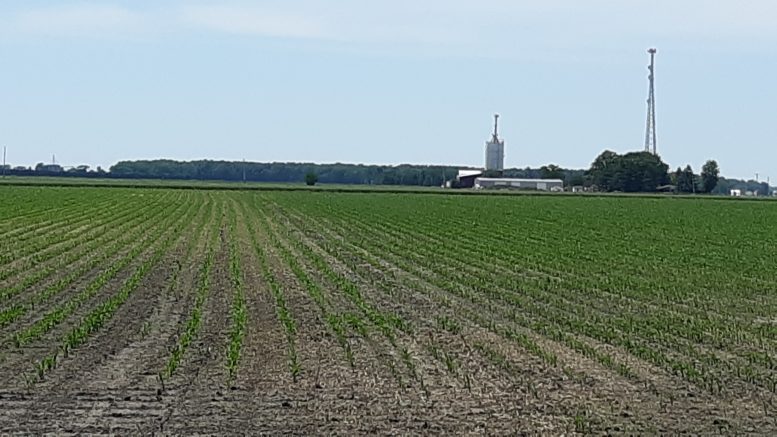BY NICK EVANS
During his visit to Ohio last week, Florida Gov. Ron DeSantis praised Republican U.S. Senate nominee J.D. Vance’s forceful opposition of the “Chinese communist party.” He said Vance would be “tough” on them in the Senate.
DeSantis described how, in Florida, he’s signed legislation banning Confucius Institutes — programs funded by the Chinese government to promote the country’s language and culture abroad. But a different bit of resistance elicited applause.
“We’re very mindful of them trying to infiltrate our economy,” DeSantis said. “We’re going to be doing legislation to block them for purchasing land in our state, and we need other states to follow that as well.”
Concerns about national security and the country’s food system drive fears of foreign entities purchasing U.S. land. Not surprisingly, when it comes to farmland, the issue tends to animate rural, traditionally conservative voters. But lawmakers on both sides of the aisle have raised concerns about the practice.
What we know — and don’t
The USDA maintains data about foreign land ownership under The Agricultural Foreign Investment Disclosure Act of 1978. The picture those data paint seems to undermine fears about some kind of covert incursion.
In all, foreign owners control less than 3% of the country’s farmland. Canadians represent the biggest share controlling a bit less than a third of the total. Owners from the Netherlands, Italy, Germany and the United Kingdom hold another third. Chinese owners, meanwhile, hold just 0.5% of privately held U.S. farmland. Even expanding the scope to include non-agricultural land, Chinese owners still represent less than 1% of foreign held acres.
But Caitlin Welsh cautions the information is far from complete. Welsh serves as director of the Global Food Security Program at the Center for Strategic & International Studies.
“We don’t know the scale of foreign land ownership in the U.S.,” she said. “We rely on data that’s voluntarily provided by states to USDA.”
“There’s, in theory, some sanctions for not reporting that data in a timely manner,” she continued, “but those sanctions are rarely applied.”
And Welsh added that even if the percentages are small, they’re not insignificant. The foreign-held land we know about would still cover the state of Iowa.
The view from Ohio
In terms of acreage held by foreign entities, Ohio ranks near the middle both in raw numbers and percentage. German investors hold roughly 77,000 acres — the largest share of the half million acres of foreign owned land in the state.
“China’s really not even on the radar,” Ty Higgins of the Ohio Farm Bureau explained.
Despite the small footprint, Higgins said the issue is getting attention because of where investors are buying.
“With this conversation about China buying up farmland near military bases, it’s really bubbling this topic back up to the surface for our members and I think for everybody in rural parts of America as well.”
Most notably, the Chinese food company Fufeng Group recently purchased land in North Dakota not far from an Air Force base. A similar story is playing out in Texas where a Chinese billionaire named Sun Guangxin bought land with plans to build a windfarm not far from a different Air Force base. Higgins didn’t know of any similar examples in Ohio.
Foreign ownership on the campaign trail
While the issue fired up rally attendees, foreign land ownership has played little if any role in Ohio’s U.S. Senate race.
In January at a Delaware County shooting range, Vance voiced skepticism about foreign actors’ influence, but his focus was on the price of single-family homes. He described hearing from a friend in real estate about first time homebuyers struggling to compete.
“Some out of state investor, often taking Chinese money — Blackrock takes a lot of Chinese money, Blackstone takes a lot of Chinese money — comes in and outbids that family by 20-30%, and that’s the end of the homeownership dream for that young family,” Vance said.
“We’ve got to make a decision,” he continued. “Do we care more about Chinese money, or do we care more about the future for our own people?”
More recently, he voiced the same skepticism and referenced farmland directly in an interview with WLWT in Cincinnati.
“Why are we letting China go up and buy American farmland and American single-family homes, right? Voters care about that stuff because they care about the future of their country,” Vance said.
In a statement his campaign said he would support action to prohibit “domestic asset purchases by the Chinese Communist Party,” including real estate, farmland or components of the country’s infrastructure.
Democratic nominee Tim Ryan has made confronting China economically a central part of his pitch to voters, as well. But foreign land purchases really haven’t come up at campaign events. In a rare point of agreement, though, Ryan shares the same suspicions as Vance. In an emailed statement he said, “America’s farmland belongs in the hands of America’s farmers.”
“The Chinese Communist Party’s malicious practice of buying up our land poses a serious threat to our national security and our ability to feed our own people,” Ryan continued. “We must do everything in our power to block China’s efforts to control our food production and ensure we keep our agricultural supply chains at home.”
And the Democratic congressman pointed to his record. He’s voted in favor of successive agriculture spending bills that direct officials to “take such actions as may be necessary” to block land purchases by companies tied to the Chinese, Russian, North Korean or Iranian governments.
Low hanging fruit
For two candidates who have underlined their antipathy toward the Chinese government, Ryan and Vance’s convergence on the issue isn’t exactly a shocker.
But Welsh, the researcher from CSIS, lands on a more nuanced view. In terms of immediate steps, she argued officials need to ensure data sent to USDA is complete and accurate. “To me, that’s low hanging fruit,” she said, arguing both sides of the aisle should welcome a clearer picture. When it comes to concerns about China’s domestic influence, though, emphasizing agriculture might be misplaced.
“If you’re worried about the influence of China in the United States, there are a lot of other sectors to be looking at in addition to agriculture,” she argued.
“And if you’re worried about quote-unquote foreign control of U.S. agricultural land,” she added, “Number one, there are countries that own a lot more than China does, and then number two, you can look at U.S. based companies in other states that are purchasing access or purchasing rights to agricultural land in other states.”
She pointed to Arizona, where overseas and out-of-state firms have bought up land to take advantage of loose water regulations. That influx, regardless of where it comes from, puts added stress on the area’s agricultural system.


